 |
| View this email in a browser |
 |
 |
Up to 84 percent of individuals with irritable bowel syndrome (IBS) perceive diet as a trigger to their GI distress. The most researched evidenced based nutritional therapy for IBS is the low FODMAP diet. Although 50-70 percent of IBS patients will effectively manage their digestive symptoms with the low FODMAP diet, it is not an intervention for all IBS patients. IBS symptoms can present in other conditions such as in celiac disease, inflammatory bowel disease and even in endurance athletes.
Join Kate Scarlata, MPH, RDN, LDN, on Wednesday, May 27, 2020, from 2–3 PM EDT, for a webinar that will focus on understanding how reducing FODMAP carbohydrates may be helpful in these patient populations will be reviewed. Dietitians should be able to select the best candidate for a three-phase low FODMAP diet as well as know when to offer a more flexible application of the diet, called "FODMAP gentle." Additionally, dietitians should be able to assess which patients might be best suited for non-diet interventions as first line therapy for symptom management. This session will cover the three-phase application of the low FODMAP diet, explain what a FODMAP gentle approach entails, and discuss other modalities to consider in your IBS patients when an exclusion diet is contraindicated.
Learning Objectives
| 1. |
Detail factors involved with FODMAPs and GI symptom induction. |
| 2. |
Describe the 3 phases of the low FODMAP diet. |
| 3. |
List the criteria for selecting the best candidate for a low FODMAP diet. |
|
| 1 CEU FREE |
Suggested CDR Learning Needs Codes: 3020, 5110, 5200, 5220
Suggested Performance Indicators: 8.1.2, 8.1.5, 8.3.1, 10.2.2
Level: 2 |
|
|
About Our Presenter
Kate Scarlata, MPH, RDN, LDN, is a Boston-based dietitian with 30 years of experience. Kate’s expertise is in gastrointestinal disorders and food intolerance, with a particular focus on the application of the low FODMAP diet for functional gut disorders. She was awarded the Outstanding Massachusetts Dietitian Award and recognized as Boston’s Best Dietitian by Boston Magazine. Kate is the author of numerous books and articles on digestive health topics including the New York Times Best Seller, The 21 Day Tummy Diet. Her latest book is The Low FODMAP Diet Step by Step. Kate completed her postgraduate training at Brigham and Women’s Hospital, a Harvard Medical School teaching affiliate. |
About The Sponsor
The Low FODMAP diet was developed by the team at Monash University in Australia. The team identified that a family of short chain carbohydrates (called FODMAPs) were major dietary triggers of Irritable Bowel Syndrome (IBS) (affecting 10-15% of the population in the United States). The Low FODMAP Diet now has a high level of clinical evidence and is becoming a primary therapy for IBS. The diet is highly effective in 3 out of 4 IBS patients. www.monashfodmap.com
Disclosures
Kate Scarlata, MPH, RDN, LDN, has the following disclosures to report: she holds stock options in Epicured and Fody Foods; she is employed by Epicured; she has received honorarium and consultant fees for blog posts, webinars, or presentations for A2 milk company, Monash University, Fody Foods, Beckon Ice Cream, Enjoy Life Foods, Salix Pharmaceuticals, and Green Valley Creamery. |



